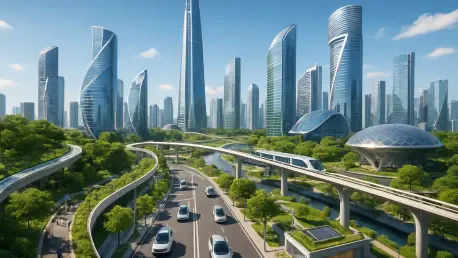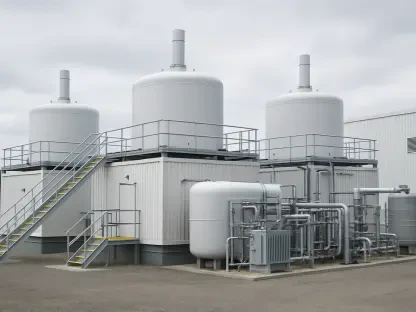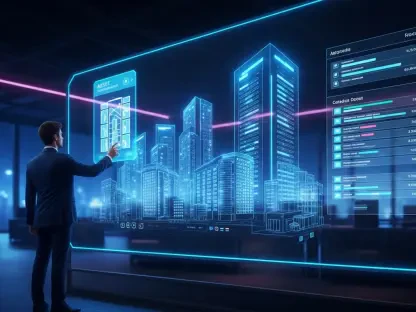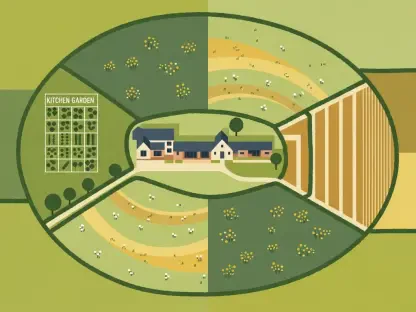South Korea has emerged as a trailblazer in the realm of smart city development, seamlessly integrating advanced technology with forward-thinking urban planning to redefine modern living, and this nation, known for its rapid technological advancements, is not just transforming its own cities but also influencing global urban trends through innovative projects and international collaborations. From the dynamic urban landscape of Seoul to ambitious ventures in countries like Vietnam and Saudi Arabia, South Korea’s commitment to creating intelligent, sustainable cities is setting a powerful example for the rest of the world. This article explores the multifaceted approach behind this leadership, delving into the strategic government policies, groundbreaking technological innovations, and unwavering focus on sustainability that drive this revolution. Additionally, it examines South Korea’s expanding global presence and the impressive market growth that underscores its position as a frontrunner in shaping the cities of tomorrow.
Government as the Catalyst for Change
South Korea’s ascent to the forefront of smart city development owes much to the proactive role of its government, which has implemented policies that blend technological advancement with urban progress. The Seoul Smart City Initiative serves as a flagship example, embedding artificial intelligence (AI) and the Internet of Things (IoT) into the city’s core infrastructure to enhance efficiency and improve quality of life across residential and commercial zones. This initiative transforms Seoul into a living laboratory for smart urban solutions, addressing everything from traffic management to energy conservation. Beyond the capital, the government has introduced mandatory Zero-Energy Building (ZEB) standards for public structures, ensuring that new constructions meet stringent energy efficiency criteria. These policies align with international sustainability goals, positioning South Korea as a model for environmentally conscious urban planning on a global scale.
Further amplifying this momentum, the South Korean government has committed substantial resources to extend its smart city expertise beyond national borders, fostering international partnerships. A notable investment of 1.1 trillion won has been allocated to support overseas projects, such as the development of Dongnam New City in Vietnam and infrastructure initiatives in Kazakhstan. This financial backing not only strengthens domestic capabilities but also showcases the country’s ambition to lead the global smart city market. Additionally, regulatory sandboxes for 25 smart city use cases, covering technologies like blockchain and AI, have been established to encourage innovation by reducing barriers to commercialization. This strategic blend of domestic policy and international outreach highlights how South Korea’s government is laying a robust foundation for a tech-driven, sustainable urban future, inspiring other nations to follow suit.
Technology Driving Urban Transformation
At the core of South Korea’s smart city revolution lies a wave of technological innovation that is redefining how urban environments are designed, built, and managed. Tools like Building Information Modeling (BIM) and digital twins have become integral to project planning, allowing for precise simulations and optimizations that reduce costs and improve outcomes. Meanwhile, AI and IoT applications are addressing pressing urban challenges, from population density to resource allocation. Companies such as TENELEVEN INC are pioneering AI-driven architectural designs and modular housing solutions, streamlining construction processes. Similarly, SmartInside AI leverages technology to enhance safety on construction sites through real-time monitoring and predictive analytics, ensuring safer urban development. These advancements illustrate how technology is not merely a tool but a transformative force in creating smarter, more adaptive cities.
Beyond individual innovations, the broader adoption of digital solutions is fostering a connected urban ecosystem that prioritizes efficiency and resilience in South Korea. Cloud-based systems and renewable energy technologies, championed by firms like Ecube Labs, are optimizing urban operations, from waste management to energy distribution. This tech-centric approach extends to enhancing livability, with IoT-enabled infrastructure facilitating seamless communication between city systems and residents. For instance, smart building connectivity ensures that energy usage is dynamically adjusted based on real-time data, reducing waste and lowering costs. The integration of these technologies reflects a holistic vision for urban spaces that are not only intelligent but also responsive to the evolving needs of their inhabitants, cementing South Korea’s reputation as a leader in leveraging technology for urban transformation.
Sustainability at the Heart of Urban Vision
Sustainability stands as a cornerstone of South Korea’s smart city framework, reflecting a deep commitment to balancing urban growth with environmental responsibility. Green building certifications such as LEED and G-SEED are increasingly standard, guiding the construction industry toward eco-friendly practices that minimize ecological impact. Compliance with Zero-Energy Building (ZEB) standards further reinforces this focus, mandating that public buildings achieve near-zero energy consumption through advanced design and materials. This push for sustainability is evident in the widespread integration of solar infrastructure and energy-efficient technologies, which are becoming hallmarks of South Korean urban projects. Such efforts demonstrate a proactive stance on addressing climate challenges while meeting the demands of rapid urbanization.
This emphasis on green practices extends beyond mere compliance, positioning South Korea as a competitive force in the global market for sustainable urban solutions. By prioritizing renewable energy and resource-efficient construction, South Korean firms gain a distinct edge, appealing to international partners seeking environmentally responsible development. The adoption of innovative materials and systems not only reduces carbon footprints but also enhances the long-term viability of urban infrastructure. This strategic focus on sustainability resonates with global trends, where eco-conscious development is becoming a prerequisite for market leadership. As a result, South Korea’s commitment to green urban planning is not just a response to regulatory pressures but a deliberate effort to shape a future where cities thrive in harmony with the environment, setting a powerful precedent for others to emulate.
Expanding Horizons and Economic Prospects
South Korea’s vision for smart cities transcends national boundaries, with its firms actively pursuing and securing high-profile international projects that amplify their global influence. Partnerships such as NAVER Cloud’s collaboration on a mixed-use smart city in Riyadh, Saudi Arabia, and the development of Dongnam New City in Vietnam underscore the country’s expanding footprint. These ventures diversify revenue streams and enhance the competitiveness of South Korean companies on the world stage. The government’s support for such initiatives, including significant funding for overseas infrastructure, ensures that domestic expertise translates into global impact. This outward-looking approach not only showcases South Korea’s capabilities but also positions it as a key player in addressing the urbanization challenges faced by emerging and established markets alike.
Economically, the smart city sector in South Korea is poised for robust growth, reflecting the success of its strategic initiatives and technological prowess. The domestic construction market, currently valued at USD 92.5 billion, is projected to grow at a steady compound annual growth rate (CAGR) of 2.8% through 2029. Meanwhile, smart city projects are expected to expand at a CAGR of 3.24% through 2033, with transportation infrastructure leading the charge by capturing a dominant market share. Government investments, such as the $349 million allocated to industrial AI, further bolster this ecosystem, empowering tech-driven firms to innovate and scale. This economic trajectory, coupled with South Korea’s global ambitions, signals a promising outlook for sustained leadership in smart urban development, offering valuable lessons and opportunities for international collaboration.
Reflecting on a Blueprint for Tomorrow
Looking back, South Korea’s journey in spearheading the smart city revolution demonstrates a masterful blend of visionary governance, technological breakthroughs, and an unwavering dedication to sustainability. The nation’s efforts have reshaped urban landscapes, both domestically and internationally, through initiatives that prioritize intelligent infrastructure and green practices. For the future, the focus should shift toward scaling these innovations, ensuring that smaller cities and developing regions can adopt similar models through accessible technology and knowledge transfer. Strengthening global partnerships will be crucial, as will continued investment in emerging fields like AI and renewable energy. By sharing its expertise and fostering collaborative frameworks, South Korea can inspire a worldwide movement toward smarter, more sustainable cities, ensuring that the lessons learned pave the way for actionable progress in the years ahead.









